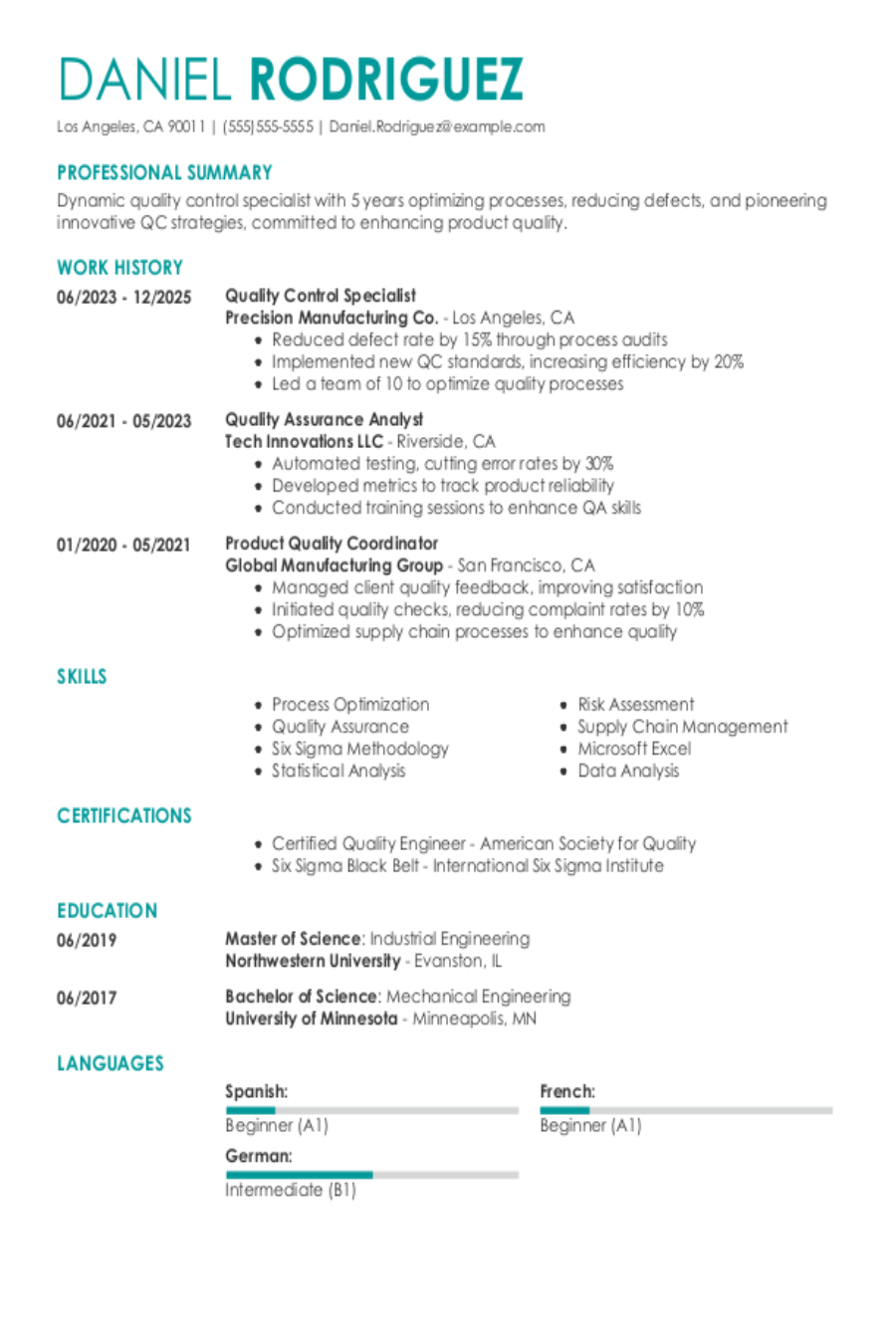Popular Healthcare Support Resume Examples
Entry-level healthcare support resume
An entry-level resume for healthcare support should highlight relevant education, certifications, volunteer experiences, and essential skills like communication, empathy, and teamwork to demonstrate readiness for the role.
Focuses on goals: This healthcare support professional emphasizes a strong foundation in patient care and clinic management, showcasing a commitment to efficiency and continuous improvement through hands-on experience and relevant education.
Places skills over experience: Choosing the functional resume format is a strategic decision for this entry-level applicant. It highlights their skills in patient care and clinic management, which are essential for healthcare support roles, rather than focusing on limited work history.
Mid-career healthcare support resume
A mid-career healthcare support resume should emphasize a combination of hands-on experience, relevant skills, and continuous professional growth to attract the attention of potential employers.
Includes mix of skills: This resume effectively illustrates a mix of hard skills, such as medical record management and vital sign monitoring, alongside soft skills like healthcare communication and patient care support.
Encourages quick scanning: An organized layout and clean design help highlight the applicant's qualifications, making it easy for recruiters to quickly identify relevant skills and experiences.
Experienced healthcare support resume
An experienced healthcare support resume should highlight relevant skills and achievements in a clear format that demonstrates the applicant's growth and contributions to patient care.
Optimized for ATS: The resume showcases a clean layout that merges a professional header with an ATS-friendly resume structure, ensuring it is easily navigable for both recruiters and automated systems.
Embraces modern design: This modern resume template effectively highlights the job seeker's innovative approach, focusing on their dedication to patient care and efficiency in healthcare support roles.
No experience healthcare support resume
A resume for an applicant with no experience aiming for a healthcare support position should highlight relevant skills, volunteer work, and any training that showcases the applicant's ability to contribute effectively in a clinical environment.
Draws from diverse experiences: Including extracurricular activities and volunteer experiences in a resume improves its appeal. This approach shows relevant skills and demonstrates a commitment to service, which can help applicants stand out in the healthcare support field.
Overcomes lack of work history: Emphasizing professional skills illustrates the job seeker's readiness for a healthcare support role, highlighting their volunteer experiences and relevant education despite limited direct work experience.
More resume examples
Healthcare Support Resume Template
Looking for a way to showcase your skills? This healthcare support resume template serves as an excellent base—simply personalize it with your own details.
Aiko Rodriguez
San Francisco, CA 94103
(555)555-5555
Aiko.Rodriguez@example.com
Professional Summary
Experienced healthcare support professional with 8 years in clinical assistance, patient care optimization and record management, skilled in leveraging administrative expertise to enhance healthcare delivery and efficiency.
Skills
- Patient Care
- Record Management
- Supply Coordination
- Clinical Assistance
- Medical Procedures
- Appointment Scheduling
- Billing Management
- Communication Enhancement
Work History
Healthcare Support
Harmony Health Center - San Francisco, CA
October 2023 - October 2025
- Improved patient care efficiency by 20%
- Managed health records for 100+ patients
- Coordinated supply chain, reducing costs by 15%
Clinical Assistant
Meadowbrook Clinic - Riverside, CA
September 2019 - September 2023
- Assisted in procedures, leading to 10% faster setup
- Maintained clinic appointments, boosting attendance
- Tracked inventory, decreasing waste by 12%
Medical Office Specialist
Riverside Medical Group - Riverside, CA
October 2017 - August 2019
- Scheduled 200+ appointments monthly
- Handled billing queries, earning patient praise
- Enhanced communication channels by 25%
Certifications
- Certified Medical Administrative Assistant - National Healthcareer Association
- Healthcare Leadership Certification - American College of Healthcare Executives
Education
Master of Health Administration Healthcare Management
University of California, San Diego San Diego, California
May 2017
Bachelor of Science Biology
California State University, Los Angeles Los Angeles, California
May 2015
Languages
- Spanish - Beginner (A1)
- French - Intermediate (B1)
- Mandarin - Beginner (A1)
Writing Your Healthcare Support Resume
With a solid understanding of effective resume examples in healthcare support, you are now prepared to explore the intricate details of how to write a resume. We will guide you through each section step by step, ensuring your application stands out.
List your most relevant skills
An effective skills section in your healthcare support resume should include a mix of technical skills, such as patient care and medical terminology, along with essential soft skills like empathy and teamwork.
To make your skills section stand out, carefully analyze job listings for keywords from the job listing that resonate with the position you are applying for. Incorporating these keywords will not only attract human recruiters but also help you pass through applicant tracking systems. By aligning your skills with what employers seek, you demonstrate that you are a strong job seeker ready to contribute to their team.
Example of skills on a healthcare support resume
- Experienced in assisting healthcare professionals to deliver quality patient care
- Skilled in managing medical records and patient information accurately
- Compassionate communicator with a strong ability to empathize with patients
- Adaptable team player who thrives in fast-paced environments
The skills section of your resume is important for showcasing your readiness for a healthcare support role. It should articulate both the technical skills specified in the job description and essential soft skills, reflecting your ability to meet the demands of the position effectively. This balance demonstrates to employers that you are well-prepared and capable.
Highlight your work history
The work experience section should communicate your achievements and how you've applied your skills in various roles. This section should be rich in keywords relevant to the healthcare industry, demonstrating not only what you did but also the impact you made.
When detailing each job entry, include key information such as your job title, the name of the employer, and the dates you were employed. Including these details helps establish your professional credibility and allows potential employers to quickly assess your background and experience in healthcare support.
Example of a healthcare support work experience entry
- Healthcare Support
HealthPlus Services - Los Angeles, CA
January 2021 - Present - Assist healthcare professionals in providing patient care by preparing examination rooms and ensuring all necessary equipment is available and sanitized
- Support patients through compassionate communication, actively listening to their concerns and providing clear information about procedures, resulting in a 98% patient satisfaction score
- Document patient vital signs and medical histories accurately using electronic health record systems, contributing to improved data integrity and compliance with health regulations
- Train new staff on patient handling protocols and emergency response procedures, improving team efficiency by 30%
- Collaborate with multidisciplinary teams to streamline patient flow and reduce wait times, achieving a 15% increase in overall clinic productivity
Aim for clarity in your bullet points. Include specific achievements and relevant skills while keeping each point concise. This balance will help you stand out without overwhelming the reader with unnecessary details.
Include your education
The education section of your healthcare support resume should effectively showcase your academic background by listing credentials in reverse-chronological order. Start with the most recent degree or diploma you've earned and work backward. If you hold a bachelor's degree or higher, there's no need to mention your high school diploma or associate degree, unless they provide specific relevance to the role you're applying for.
When your education is ongoing or incomplete, it's important to mention the highest level of education you've achieved along with an anticipated graduation date if applicable. For those who are current students or have recently completed their studies, consider including bullet points that highlight relevant coursework or significant academic accomplishments.
Common certifications for a healthcare support resume
- Certified Nursing Assistant (CNA) – National Network of Career Nursing Assistants (NNCNA)
- Certified Medical Assistant (CMA) – American Association of Medical Assistants (AAMA)
- Basic Life Support (BLS) – American Heart Association (AHA)
- Phlebotomy Technician Certification (CPT) – National Healthcareer Association (NHA)
Sum up your resume with an introduction
Your resume's profile section is important as it sets the tone for your entire application. It's your first opportunity to make a strong impression and demonstrate your suitability for the healthcare support role.
If you're an experienced professional, a well-crafted professional summary is key. This format allows you to succinctly showcase your most significant accomplishments and expertise, enabling employers to quickly understand why you're an ideal job seeker. If you have little experience, create a resume objective centered on your professional development goals.
Professional summary example
Compassionate healthcare support specialist with over 5 years of experience in diverse medical settings. Demonstrated ability to improve patient care through effective communication, careful record-keeping, and collaboration with healthcare teams. Proficient in managing patient inquiries, assisting with administrative tasks, and ensuring compliance with health regulations.
Resume objective example
Compassionate healthcare support professional eager to use strong communication and organizational skills to improve patient care at a dedicated medical facility. Committed to fostering a positive environment while assisting with administrative tasks and collaborating effectively with healthcare teams for optimal service delivery.
When crafting your resume profile, begin with your job title. This approach instantly conveys your professional identity, allowing employers to quickly understand who you are and what you do, whether you choose a professional summary or an objective statement.
Add unique sections to set you apart
Including optional resume sections in your healthcare support application can effectively highlight your unique qualifications. These sections allow you to showcase specific skills and experiences that set you apart from other applicants.
You can reveal various aspects of your professional identity through these optional entries. Consider adding relevant hobbies, such as first aid training or community wellness activities, which indicate your commitment to health. Additionally, volunteer work at local clinics or health fairs demonstrates not only your dedication but also valuable interpersonal skills essential for a career in healthcare support. Show employers who you are beyond your job titles and responsibilities.
Three sections perfect for a healthcare support resume
- Languages: In healthcare support, effective communication is essential for patient care. If you speak additional languages, highlight these language skills on your resume to improve interactions and improve patient experiences.
- Volunteer Work: Incorporating volunteer work on a resume not only showcases your dedication to helping others but also helps you build your professional skills, making you a more attractive applicant in the healthcare support field.
- Accomplishments: In healthcare support, quantifiable accomplishments are vital for demonstrating your effectiveness in improving patient care. Highlight these achievements by incorporating them into your work history or featuring them in a separate accomplishments section.
5 Resume Formatting Tips
- Choose a format that matches your career stage.
Selecting the right resume format depends on your experience and career level. If you have a solid work history, go for a chronological format to showcase your progression. For those just starting out, a functional resume can highlight skills over experience. Consider using a combination resume if you want to present both effectively.
- Pick a smart resume template.
Using a professional resume template improves readability and keeps your information organized. A well-structured format allows hiring managers to quickly scan your qualifications. If you prefer not to use a template, aim for a clean design and select fonts that are easy to read, ensuring clarity in your presentation.
- Select an appropriate font.
Choose a professional font that improves readability on your resume. Opt for classic styles such as Helvetica, Garamond, or Trebuchet MS to ensure clarity for both ATS and hiring managers.
- Use consistent formatting.
Align your resume to the left and maintain uniform margins. This improves readability and presents a polished, professional image to potential employers.
- Keep your resume to one or two pages.
When crafting your resume, remember that resumes should be one page long. If you have extensive experience, a second page can be acceptable. Keep your content concise and focused on what truly matters to highlight your qualifications.
What’s the Average Healthcare Support Salary?
Healthcare support salaries vary based on location, career level, and qualifications.
This data, provided by the Bureau of Labor Statistics, will show you expected salary ranges for healthcare supports in the top 5 highest-paying states, including the District of Columbia. The figures reflect the most current salary data available, collected in 2024.
- Full Range
- Most Common (25th–75th percentile)
- Average
District of Columbia
Most common: $57,480 - $92,280
Alaska
Most common: $56,310 - $72,490
Washington
Most common: $49,870 - $64,830
Massachusetts
Most common: $45,360 - $67,720
California
Most common: $45,310 - $64,540
Tools for Your Job Search
Are you preparing to apply for a healthcare support position? Before you submit your application, consider using our ATS Resume Checker. This essential tool gives you valuable feedback on how well your resume aligns with the automated systems that many healthcare providers use for initial applicant screening.
Looking for an extra edge in your job search? Our AI Resume Builder provides tailored recommendations specifically designed for healthcare support roles, featuring professional templates that effectively showcase your skills and experience to potential employers.
Frequently Asked Questions
Last Updated: October 10, 2025
Absolutely. A cover letter is important because it provides context to your resume and creates valuable communication opportunities with employers. This is your chance to express why you’re passionate about the healthcare support role and how your skills make you an ideal job seeker. So, take a moment to write a cover letter that improves your application.
To streamline this process, consider using our AI Cover Letter Generator, which allows you to create tailored cover letters quickly and easily. You can also choose from various cover letter template options that correspond with your resume, helping you present a polished and professional image to potential employers.
A resume is a concise document, typically spanning one to two pages, that highlights your skills and experience relevant to a specific job. In contrast, a CV (curriculum vitae) can extend several pages and provides a detailed account of your academic background, research contributions, publications, and professional experiences.
When applying for roles in academia or specialized fields like healthcare support, you may need to submit a CV. If you're unsure how to create one or want to make it stand out, our online CV Maker is here to help! With various CV templates tailored for different industries and career levels, you can quickly craft an impressive CV that showcases your qualifications effectively.
A frequent resume mistake healthcare support professionals make is using templates that aren't ATS-compatible. To avoid this issue, choose a resume template is ATS-friendly format and tailor your resume to align with the specific job description. This strategy increases your chances of passing through initial screenings and landing interviews.
To improve your healthcare support resume, focus on highlighting the essential skills that match the job description. Review the job listing carefully and extract relevant keywords to showcase your qualifications effectively. This tailored approach will illustrate your fit for the position and increase your chances of standing out to employers.
Practice answering job interview questions and answers. This preparation not only boosts your confidence but also equips you to tackle any surprises that may arise during the interview.
When applying for healthcare support roles, briefly mention your career aspirations in your resume summary. For a deeper exploration of your goals, use your cover letter to articulate how the position aligns with your ambitions. Focus on seeking opportunities that foster growth and advancement in the healthcare field.
Was this information helpful? Let us know!
Hailey is a career advice writer dedicated to helping job seekers excel in their careers.
More resources

Summary of Qualifications: 13 Examples for Your Resume
Our guide will help you write a summary of qualifications that...

How to Write a Cover Letter in 2025
A great cover letter will impress employers and get you hired....

Cost of Living Crunch: 92% of Americans Cut Back Spending in 2025
Resume Now s survey reveals a cost of living crisis that has l...




